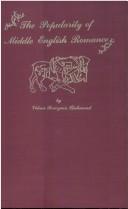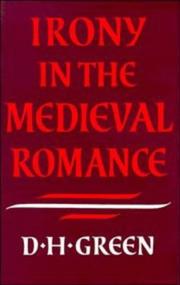| Listing 1 - 3 of 3 |
Sort by
|

ISBN: 0879721146 9780879721145 Year: 1975 Publisher: Bowling Green, Ohio Bowling Green University Popular Press
Abstract | Keywords | Export | Availability | Bookmark
 Loading...
Loading...Choose an application
- Reference Manager
- EndNote
- RefWorks (Direct export to RefWorks)
Fiction --- Old English literature --- Romances, English --- English literature --- Popular literature --- Civilization, Medieval, in literature --- History and criticism --- Romances, English - History and criticism --- English literature - Middle English, 1100-1500 - History and criticism --- Popular literature - England - History and criticism --- Medieval romance
Book
ISBN: 0091140005 0091140013 Year: 1973 Publisher: London Hutchinson
Abstract | Keywords | Export | Availability | Bookmark
 Loading...
Loading...Choose an application
- Reference Manager
- EndNote
- RefWorks (Direct export to RefWorks)
Fiction --- Thematology --- anno 500-1499 --- Literature, Medieval --- -Romances --- -Chivalric romances --- Chivalry --- Courtly romances --- French romances --- Medieval romances --- Romances, French --- Romans courtois --- French literature --- European literature --- Medieval literature --- History and criticism --- Romances --- History and criticism. --- -History and criticism --- -French literature --- Chivalric romances --- Medieval romance

ISBN: 0521224586 0521022169 0511519516 0511826362 Year: 1979 Publisher: Cambridge Cambridge University press
Abstract | Keywords | Export | Availability | Bookmark
 Loading...
Loading...Choose an application
- Reference Manager
- EndNote
- RefWorks (Direct export to RefWorks)
Despite the fashionable standing of irony in studies of modern literature and its occasional application to medieval studies in a number of recent works, no sustained analysis of this phenomenon has yet been attempted for medieval literature. Professor Green attempts to fill the most important part of this lacuna by discussing irony in the medieval genre in which it is employed most frequently and with the greatest sophistication, the romance. The approach is therefore directed more towards the genre as such than to any specific example, and, although the book is written primarily from a Germanist's point of view, it also takes into account the romances of Chrétien de Troyes and their German adaptations, various examples from the Tristan tradition in France and Germany, Flamenca as an example from Provence, as well as Chaucer's Troilus and Criseyde, and Sir Gawain and the Green Knight from England. Proceeding from a working definition of medieval irony and a survey of the signals which may allow us to perceive its presence, Professor Green considers the possibilities, rhetorical and otherwise, of registering irony in courtly literature at large. From this he moves on to discuss the major themes to which irony may be applied (chivalry and love), as well as the ways in which the narrative is organised so as to bring out any ironic implications of these themes. Subsequent chapters are concerned with the various types of irony to be distinguished: verbal irony, irony of the narrator, dramatic irony, the irony of values, and structural irony. A concluding chapter sums up the reasons, aesthetic and social, for the prevalence of irony in this particular genre of medieval literature.
Irony in literature --- Romances --- -Chivalric romances --- Chivalry --- Courtly romances --- French romances --- Medieval romances --- Romances, French --- Romans courtois --- French literature --- Literature, Medieval --- History and criticism --- -Irony in literature --- European literature --- Medieval literature --- Fiction --- Comparative literature --- anno 1200-1499 --- Chivalric romances --- Irony in literature. --- History and criticism. --- Arts and Humanities --- Literature --- Medieval romance
| Listing 1 - 3 of 3 |
Sort by
|

 Search
Search Feedback
Feedback About UniCat
About UniCat  Help
Help News
News